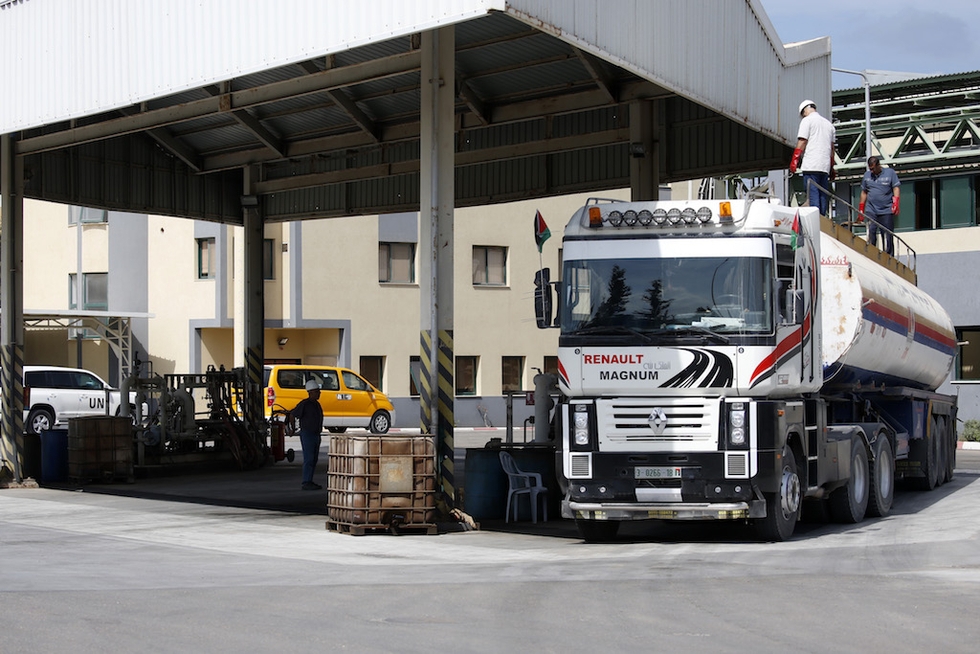Israel halts fuel deliveries to besieged Gaza Strip

Israeli Defence Minister Avigdor Lieberman has ordered deliveries of fuel to the besieged Gaza Strip to be suspended after protests on Friday during which the Hamas-run health ministry said seven Palestinians were killed by Israeli troops.
The suspension comes just days after a United Nations-brokered deal to supply the territory with Qatari-bought fuel came into effect.
The Israeli army said five Palestinians were shot dead on Friday after breaking through the fence that separates the enclave from Israel and attacking an army post.
But the Gaza health ministry said seven Palestinians were killed as thousands of protesters approached the heavily-guarded Israeli border.
It said four died along the frontier east of Al-Bureij in central Gaza, two east of Gaza City, and one near Rafah in southern Gaza.
It named one of those killed as Mohammed Abbas, who was shot in the head.
It said all the victims were males aged between 17 and 29.
The health ministry said 192 Palestinian demonstrators were injured. Of those, 140 people - including 45 children, eight women and two paramedics - were hurt by live ammunition.
Israeli army spokesman Jonathan Conricus said around 20 Palestinians had crossed the border in an "organised attack" after an explosive device destroyed a portion of the fence.
About five of those who got through the fence assaulted an Israeli army position and were "repelled," he wrote on Twitter.
A Middle East Eye photographer in Gaza said that three Palestinian youths had approached the Israeli military fence, crossed it and got into a fist-fight with Israeli snipers stationed west of the fence.
"Israel will not tolerate a situation in which fuel tankers are allowed to enter Gaza on the one hand, while terror and violence are used against [Israeli] soldiers and Israeli citizens on the other," the statement from Lieberman's office read.
Four Israeli tanker trucks had delivered fuel to Gaza on Friday morning before "riots" broke out, Lieberman said.
'Catastrophic' humanitarian situation
For months Gaza residents have been receiving only four hours of mains electricity a day on average.
The UN has warned that Israel's 11-year blockade of the enclave has resulted in a "catastrophic" humanitarian situation.
The terms of the Qatar fuel deal saw Doha, a long-time Hamas backer, pledge to pay $60m for fuel to be brought into Gaza over six months to supply the strip's sole power plant.
The first fuel delivery had arrived at the besieged Gaza Strip's only power station on Tuesday after entering through Israel in a bid to alleviate conditions in the Palestinian enclave.
A Qatari official said the supply of fuel was intended to "to avert an escalation in the existing humanitarian disaster from becoming worse".
"There are no political motives behind this step," the official said.
"It is important to note that this operation is taking place through the United Nations, which is authorised to seek the necessary permissions."
But the delivery was met with criticism by officials close to Palestinian Authority President Mahmoud Abbas, whose rival administration was not involved.
In a rare interview recently, Hamas's Gaza head Yahya Sinwar encouraged world powers to work with it to ease suffering in the strip.
Jason Greenblatt, US President Donald Trump’s peace envoy, had hailed the fuel agreement.
Great March of Return
Palestinians have been protesting every Friday since 30 March as part of the Great March of Return.
Since the demonstrations began, the Israeli army has killed at least 205 Palestinian protesters and wounded thousands more, according to Gaza's health ministry.
The majority were killed during border demonstrations, though others have died in airstrikes and tank shelling.
One Israeli soldier has been killed over the same period.
Protesters have sent incendiary devices attached to balloons into Israeli territory during demonstrations, which Israel says has caused hundreds of thousands of dollars-worth of damage to farmland.
The protesters are demanding to be allowed to return to lands now inside Israel, from which their families fled or were displaced during the 1948 war surrounding the creation of the Jewish state.
They are also calling for Israel to end its crippling eleven-year blockade of the strip.
Israel's army said approximately 14,000 "rioters and demonstrators" took part in Friday's protests.
Hamas leader Ismail Haniyah attended the protests east of Gaza City and hailed the ongoing demonstrations.
Stay informed with MEE's newsletters
Sign up to get the latest alerts, insights and analysis, starting with Turkey Unpacked
Middle East Eye delivers independent and unrivalled coverage and analysis of the Middle East, North Africa and beyond. To learn more about republishing this content and the associated fees, please fill out this form. More about MEE can be found here.




